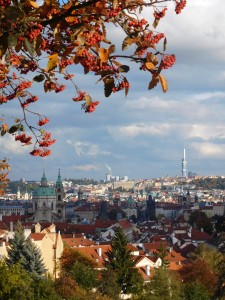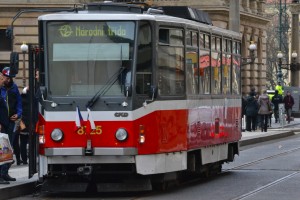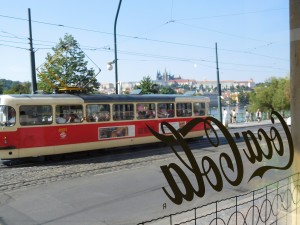 |
| One of the first Czech words I learned was září, for the month September. It comes from the word zářit, "to shine". |
Walking into the apartment at the end of the day, you’re ready to swap stories. Today was filled with communicative woes--“I thought he said… I guess that means... the look on her face when I asked for...”. Cringing and laughing at the blunders of others, there is an odd sense of honor when your own was the worst.
 |
| The best way to get around Prague is tramvají, by tram. |
The term “language barrier” is misleading. It creates the image of a wall--a blockade between you and the rest of the country. However, in truth, this feeling of division is only temporary. Within a couple weeks, you learn how to survive the language. You learn how to navigate daily interactions- dobrý den, prosím, děkuji, na shledanou. At the very least, you master the apologetic smile, and manage “promiňte, nemluvim moc Český”--sorry, I don’t speak much Czech. The language barrier is not a wall, not a blockade, but a series of blush-worthy moments.
It is the face of the woman at the rock wall. You just asked for a climbing shoe “čtyři sta” instead of “čtyřicet”. The difference? One is the size of an average foot, while the other is a size 400.
It’s grinning with your first “dobrý den” to the man on the tram, but panicking when he continues the conversation. Pleasant greetings are as far as you’ve gotten in your Czech Language class.
It’s the all too familiar look of confusion on the face of the waiter or shop clerk or barista. Writing in Czech is one thing. Pronunciation is another.
It is the feeling of pride when someone asks you for directions on the street, and the subsequent feeling of frustration when you can’t communicate the route.
 |
| The month of November is called listopad, or "leaves falling". |
It’s rehearsing a dialogue in you mind, over and over again, while waiting in line at the cafe (Disclaimer: the accuracy of Google translate is not, in fact, dependable).
It’s handing over your phone, with a pre-typed explanation, to the woman at the box office. Given her expression, the preparation was not appreciated (I repeat: do not rely on Google translate).
It is grocery runs that take twice as long, because time must be spent decoding ingredients--voda, ořešák squash, mrkev, mléko, sýr, sůl (for my vegan-inclined friends, I would not suggest this soup).
It’s grabbing an extra shirt off the rack on the walk to the fitting room. You only want to try four items, but pět (five) is easier to pronounce.
It’s filling a park bench conversation with smiles and nods. You can’t bring yourself to tell the old woman that you haven’t understood a word.
 |
| Chtěla bych Kola--I would like a Cola. |
Walking into the apartment at the end of the day, you’re ready to swap stories. Today was a good day--you got through an entire grocery transaction without a single word of English. You ordered a coffee with “kávu, prosím”. And unless he was just being nice, you might have fooled the barista into thinking you were Czech too.
Taylor T. is the Fall 2016 CEA MOJO in Prague, Czech Republic. She is currently a junior studying Marine Biology, Art, Wildlife Conservation, and Global Studies at the University of Delaware.







